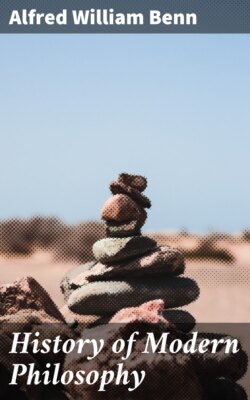History of Modern Philosophy

Реклама. ООО «ЛитРес», ИНН: 7719571260.
Оглавление
Alfred William Benn. History of Modern Philosophy
History of Modern Philosophy
Table of Contents
Chapter I
THE PHILOSOPHICAL RENAISSANCE
Chapter II
THE METAPHYSICIANS
Chapter III
THE THEORISTS OF KNOWLEDGE
Chapter IV
THE GERMAN IDEALISTS
Chapter V
THE HUMANISTS OF THE NINETEENTH CENTURY
BIBLIOGRAPHY
INDEX
Отрывок из книги
Alfred William Benn
Published by Good Press, 2019
.....
The desperate efforts of some apologists to whitewash Bacon are apparently due to a very exaggerated estimate of his services to mankind. Other critics give themselves the pleasure of painting what has been called a Rembrandt portrait, with noon on the forehead and night at the heart. And a third class argue from a rotten morality to a rotten intelligence. In fact, Bacon as little deserves to be called the wisest and greatest as the meanest of mankind. He really loved humanity, and tried hard to serve it, devoting a truly philosophical intellect to that end. The service was to consist in an immense extension of man's power over nature, to be obtained by a complete knowledge of her secrets; and this knowledge he hoped to win by reforming the methods of scientific investigation. Unfortunately, intellect alone proved unequal to that mighty task. Bacon passes, and not without good grounds, for a great upholder of the principle that truth can only be learned by experience. But his philosophy starts by setting that principle at defiance. He who took all knowledge for his province omitted from his survey the rather important subject of knowledge itself, its limits and its laws. Had his attention been drawn that way, the very first requisite, on empirical principles, would have been to take stock of the leading truths already ascertained. But the enormous vanity of the amateur reformer seems to have persuaded him that these amounted to little or nothing. The later Renaissance was an age of intense scientific activity, conditioned, in the first instance, by a revival of Greek learning. Already before the middle of the sixteenth century great advance had been made in algebra, trigonometry, astronomy, mineralogy, botany, anatomy, and physiology. Before the publication of the Novum Organum Napier had invented logarithms, Galileo was reconstituting physics, Gilbert had created the science of magnetism, and Harvey had discovered the circulation of the blood. These were facts that Bacon took no pains to study; he either ignores or slights or denies the work done by his illustrious predecessors and contemporaries. That he rejected the Copernican theory with scorn is an exaggeration; but he never accepted it, notwithstanding arguments that the best astronomers of his time found convincing; and the longer he lived the more unfavourable became his opinion of its merits. And it is certain that Tycho Brahe's wonderful mass of observations, with the splendid generalisations based on them by Kepler, are never mentioned in his writings. Now what really ruined Aristotelianism was the heliocentric astronomy, as Bruno perfectly saw; and ignorance of this left Bacon after all in the bonds of medieval philosophy.
We have seen in studying Bruno that the very soul of Aristotle's system was his distinction between form and matter, and this distinction Bacon accepted without examination from scholasticism. The purpose of his life was to ascertain by what combination of forms each particular body was constituted, and then, by artificially superinducing them on some portion of matter, to call the desired substance into existence. His celebrated inductive method was devised as a means to that end. To discover the forms "we are instructed first to draw up exhaustive tables of the phenomena and forms under investigation, and then to exclude from our list any 'form' which does not invariably co-exist with the phenomenon of which the form is sought. For example, if we are trying to discover the form of heat it will not do to adduce 'celestial nature'; for, though the sun's light is hot, that of the moon is cold. After a series of such exclusions, Bacon believed that a single form would finally remain to be the invariable cause of the phenomenon investigated, and of nothing else" (F. C. S. Schiller).
.....